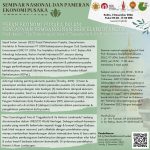Abstract
List of all organizations and speakers involved: Sponsors: American Planning Association (APA) International Council on Monuments and Sites (ICOMOS) Jeffrey Soule, speaker Participating: Regency of Gianyar, Bali His Excellency Anak Agung Bharata, speaker Indonesian Heritage Trust Center for Heritage Conservation, Dept. of Architecture and Planning, Gadjah Mada University Laretna T. Adishakti, Speaker Program: Jeffrey Soule, Introduction and overview, case example Rural Villages in China 5 minutes His Excellency Anak Agung Bharata, Presenting the Indonesian Network of Heritage Cities and how government is effectively working with NGOs and Educational Institutions 15 minutes Laretna T. Adishakti, Overview of the Indonesian Heritage Trust, cases of government engagement and local participation 15 minutes Representative from JeJu to speak on the role of planning and governance for cultural heritage, 15 min. Discussion: Audience Questions Description: The definition of cultural heritage in its increasingly broader significance must be discussed in the context of governance and planning structures. The Side Event identifies the key contemporary issues in the conservation of urban heritage to be urbanization, globalization and the loss of local identity, unsustainable tourism, natural disasters including climate change related disasters, relationship of heritage with local communities, inadequate integration of heritage considerations in urban planning, the absence of ecological perspectives in urban settlement planning and policies, and the significance of human-rights-based approaches to cultural and natural heritage processes and outcomes. The session will use practical case examples from Zanzibar, China and Indonesia to outline some key ways in which culture and cultural heritage contributes to making cities and settlements sustainable as a driver of inclusive economic development; an enabler for social cohesion, inclusion and equity; and in promoting the livability and sustainability of urban areas. The program demonstrates the importance of community participation through cultural heritage. The examples will describe the role of civic participation in shaping plans and governance using heritage as an avenue for engagement. The newly adopted Agenda 2030 as the 15-year sustainable development goals, the “SDGs” for the world, the New Urban Agenda Zero Draft, the need for consideration of cultural heritage conservation with sustainable development has come about due to a number of conditions, challenges, and opportunities. Approaches to heritage conservation and must be recognized for its important role in shaping both our current urban condition and future new urbanization. Maximizing the productivity of urban areas depends on a variety of factors from the creative use of its heritage potential to the creative use of financial instruments and management capacities. Culture and cultural heritage bring a variety of benefits to urban areas with regard to enhancing sustainability that can be maximized through effective and creative planning and design. These benefits range from the embodied energy of reused structures, to the value of compact and dense urban forms, public spaces, recognizing diversity, enhancing social cohesion, and through the re-humanizing of urban areas through walkable and human-scaled spaces and forms. The presenters propose key entry points for culture and cultural heritage in the New Urban Agenda. Detailed guidance documents and tools to assist in the complex and important task of integrating culture and cultural heritage into the SDGs and the New Urban Agenda will be part of the follow up to the session and taken up in Quito.
Author : Dr. Ir. Laretna T. Adishakti, M. Arch.
The Indonesian Heritage Trust: Cases of Government Engagement and Local Participation




